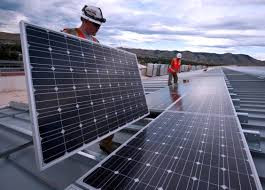Are you interested in solar panels and the attractive returns they offer, but you're still on the fence? Perhaps you've been considering getting solar panels installed on your home or business.
However, you might haven't taken that final step. This could be due to uncertainty about whether it will potentially save you money.
This is a reasonable concern to have but only if you aren't taking advantage of the Michigan solar incentives and tax credits available to you. Read this guide to learn more about how you can pay less for your solar installation by taking advantage of various tax credits and state rebates.
Annual Incentives for Homeowners and Businesses
Michigan has great solar incentive programs for both homeowners and businesses. Incentives are designed to provide financial gains for those who choose to install solar on their roof, business, or property.
It offers several tax credits for homeowners and businesses that install solar. The state provides up to 22% of the total cost in 2023. The program also provides additional incentives of:
- grant funding
- free or discounted technical assistance
- equipment financing
With all of these incentives, homeowners and businesses have the incentive to help reduce their energy costs. Thus, make use of clean renewable energy. This program helps Michigan to become more energy independent while creating sustainability in the state.
Depending On the Solar System Size
The annual incentive program provides payment for every kilowatt-hour (kWh) of electricity generated by a solar panel system. The amount of the incentive payment is based on two factors. These are the size of the solar panel system and the electricity generated by the system.
Depending On the Government
The incentive payment can help to significantly reduce the cost of owning and maintaining a solar panel system. The annual incentive program is typically administered by the state government. Utility companies also take part in it.
Net Metering As Income Opportunity
In Michigan, net metering allows homeowners and businesses to earn income. This comes from the excess electricity their solar installations produce.
The utility company purchases excess energy at a rate determined by Michigan State laws. This is when the residential or commercial solar panel systems generate more electricity than the owners consume during a given billing period.
This extra energy often referred to as net metering is the difference between the solar energy produced and the energy consumed. The cost savings and additional revenue earned from net metering investment in renewable energy are sound.
Michigan net metering is an excellent opportunity to reduce energy costs. It allows you to earn a steady stream of income. Solar net metering provides an ideal trifecta. This is by also cutting down on energy consumption and creating an environmentally-beneficial form of energy production.
Add to Property Value
Homeowners in Michigan can now take advantage of solar energy incentives. These incentives can significantly increase the value of their property. Homeowners can save money on electricity bills. This is by installing solar panels. They can improve their homes' energy efficiency and add value to their properties.
These solar energy incentives can come in the form of tax credits and rebates, providing homeowners with a financial boost while they are striving to go green. The effect of these incentives, combined with the long-term cost savings associated with using solar energy, make it an attractive way to increase the value of a Michigan home.
Property Tax Exemption
In Michigan, property tax exemptions are available for solar panel systems installed on residential and commercial properties. This means that the value of the solar panel system is not included in the property's assessed value for property tax purposes.
This can help to reduce the overall cost of owning and maintaining a solar panel system. This is a benefit of the lowered property tax bill for the homeowner or business owner. There are some factors to consider before one can be exempt.
Installed Within the Property
To be eligible for the property tax exemption, the solar panel system must be installed on a property that is used primarily for residential or commercial purposes. The system must also meet certain technical requirements and must be connected to the grid to be eligible for the exemption.
Value of Solar Panel
The property tax exemption applies to the value of the solar panel system and any associated equipment, such as inverters and charge controllers. It does not apply to the value of the property itself or any other improvements made to the property.
Depending on the Municipality
In Michigan, the property tax exemption is typically administered by the local government. It varies depending on the county or municipality. It's recommended to check with your local government website. Better yet, consult with a solar panel installation expert to find out the most recent and up-to-date information on the property tax exemptions available in your area.
And if you are not sure how to maximize the incentives you are qualified to claim, simply get more help from experts within your locality.
Understand Michigan Solar Incentive for 2023
Michigan Solar Incentives are a great program for those interested in a renewable, cost-effective energy choice. The incentives are growing and improving. This makes it easier to take advantage of this clean energy option.
Take the opportunity to maximize your savings in the years to come by signing up for the program and start taking steps towards a sustainable future.
For more reads aside from this article on going solar in Michigan, visit our main blog.





